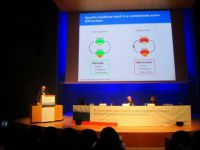 Under the 4th International Workshop on the treatment of liver and lung metastases in colorectal cancer, organized by the Hospital Universitari Mutua Terrassa, University of Barcelona, has occurred Panitumumab symposium: the value of personalized medicine Amgen and in which participated Dr. Eduardo Diaz-Rubio, head of Medical Oncology University Hospital Clinico San Carlos, Madrid, Dr. Jean-Yves Douillard, the Institut de l'ouest Cancérologie (ICO) René Gauducheu, Nantes, France and Dr. Cristina Nadal Hospital Clínic of Barcelona. During the symposium the results of the PRIME study published in the New England Journal of Medicine on biomarker RAS mutational status, by Dr. Jean-Yves Douillard, first author of the paper were presented. According Douillard, the study shows that "in a patient with metastatic colorectal cancer, the probability that the biomarker is mutated RAS is 50-50".
Under the 4th International Workshop on the treatment of liver and lung metastases in colorectal cancer, organized by the Hospital Universitari Mutua Terrassa, University of Barcelona, has occurred Panitumumab symposium: the value of personalized medicine Amgen and in which participated Dr. Eduardo Diaz-Rubio, head of Medical Oncology University Hospital Clinico San Carlos, Madrid, Dr. Jean-Yves Douillard, the Institut de l'ouest Cancérologie (ICO) René Gauducheu, Nantes, France and Dr. Cristina Nadal Hospital Clínic of Barcelona. During the symposium the results of the PRIME study published in the New England Journal of Medicine on biomarker RAS mutational status, by Dr. Jean-Yves Douillard, first author of the paper were presented. According Douillard, the study shows that "in a patient with metastatic colorectal cancer, the probability that the biomarker is mutated RAS is 50-50".
Selection of patients
Dr. Douillard has stressed the importance of "the selection of patients who should be treated with FOLFOX-panitumumab should be based on knowledge of the RAS mutational status, NRAS and KRAS exons 2, 3 and 4, since the benefit treatment is a 22% reduction in risk of death and 28% reduction in risk of disease progression. "Likewise, the French doctor added that "patients with any type of RAS mutations experience a significant decrease in the effect of treatment with FOLFOX-panitumumab."
Douillard stressed that according to the results of this study, the European Commission adopted in October 2013, a new indication for panitumumab extending it to patients with non-mutated RAS biomarker.
Oriented molecular alterations Treatments
The study reaffirms the importance of cancer biomarkers in cash and personalized treatment for cancer patients. On this issue has been referred to Dr. Eduardo Diaz-Rubio has said that, despite the use of biomarkers that help tailor treatments, "personalized medicine is still not a reality. You speak of precision medicine is more suited to what we are experiencing today. "The Dr.Díaz-Rubio also wanted to emphasize that "more and more treatments are aimed at the molecular alterations rather than to the location of the tumor."
The importance of biomarkers
For his part, Dr. Cristina Nadal explained to those present how the translation of the study data to clinical practice is carried out. "Doctors we set targets in the treatment of our patients, and predictive biomarkers help us know which treatment is most effective for achieving these goals." Despite acknowledging that "thanks to biomarkers has been to treat all patients equally, to separate" and that "selecting the best population more effectively in survival," Dr.. Navarro has recognized that these biomarkers predictive "is not much about."





